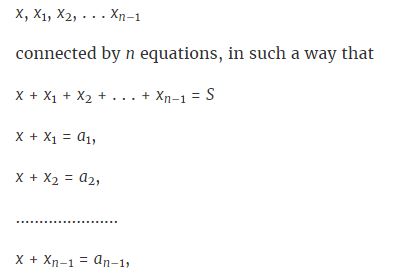Thymaridas of Paros
Thymaridas of Paros (Greek: Θυμαρίδας; c. 400 – c. 350 BCE) was an ancient Greek mathematician and Pythagorean noted for his work on prime numbers and simultaneous linear equations.
An early Pythagorean of uncertain date, Thymaridas was a number theorist from the Aegean island of Paros. He defined a unit as a “limiting quantity” (see lamblichus, In Nicomachi . . ., p. 11, 2–3); and he is said to have called a prime number εύθυγραμμικός (“rectilinear”), because it can only be established one-;dimensionally (lamblichus, op. cit., p. 27, 4-5), since the only measures of a prime number are itself and one.
But Thymaridas’ chief contribution to number theory was his ὲπάυθημα(“bloom”), which he expressed rather obscurely in generalized form (lamblichus, op. cit., p. 62, 18 ff.). The rule leads to the solution of a certain set of n simultaneous simple equations connecting n unknowns. The unknown quantity is called “an undetermined number of units” (that is, x); the known quantities are ώριομέυα (“determined”). The principle of the rule has been explained by Heath as follows:
Let there be n unknown quantities

the solution is
lamblichus shows that other equations can be reduced to this form (lamblichus, op. cit., p. 63, 16 ff.); he gives as an example an indeterminate problem having four unknown quantities in three linear equations. It is not certain that Thymaridas was responsible for the extension of his method.
Of Thymaridas’ life we are told only that he fell from prosperity to poverty and that consequently Thestor of Poseidonia sailed to Paros to help him with money specially collected for his benefit (lamblichus, De vita pythagorica, p. 239). “Eumaridas” in a list of Parian Pythagoreans (lamblichus, op. cit., p. 267) may be a mistake for Thymaridas.
BIBLIOGRAPHY
On Thymaridas and his work, see T. L. Heath, A History of Greek Mathematics, I (Oxford, 1921), 69, 72, 94; lamblichus, in Nicomachi arithmeticam introductionem, H. Pistelli, ed. (Leipzig, 1894), 11, 2–3; 27, 4–5; 62, 18 ff.; 63, 16 ff.; and De vita pythagorica, L. Deubner, ed. (Leipzig, 1937).
[1]
Source
[1] "Encyclopedia.com" by G. Huxley












